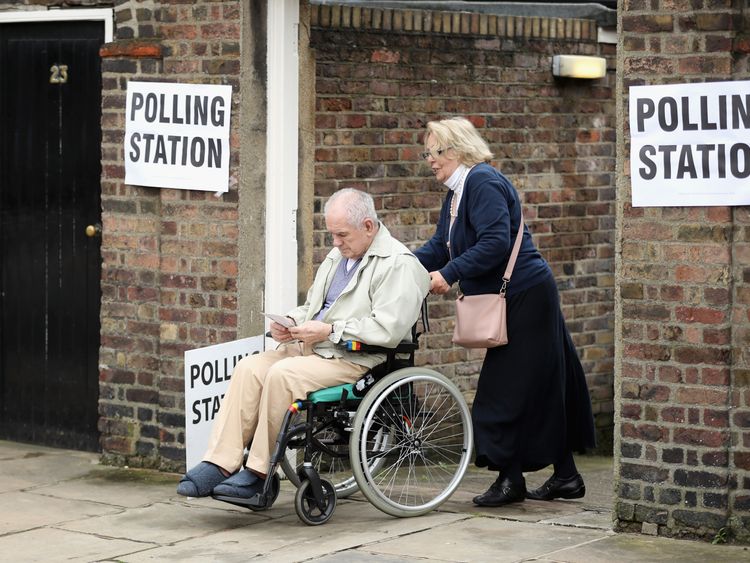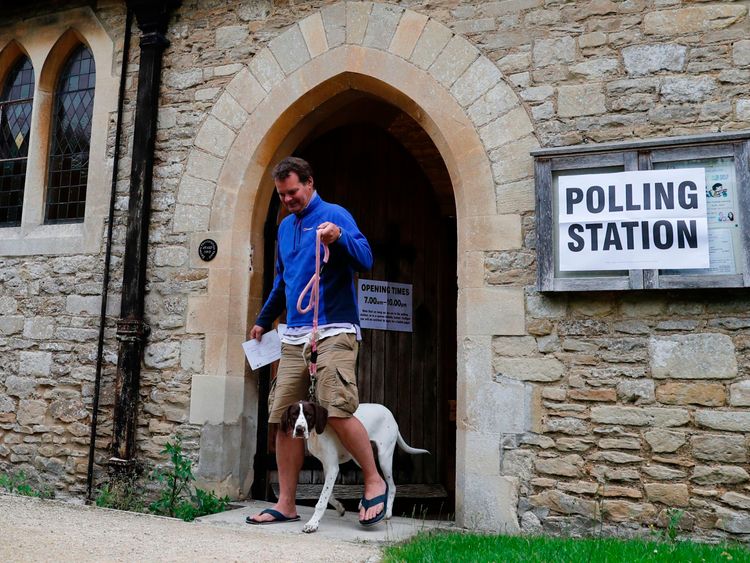The right to vote is a crucial liberty which underpins democracy, but there are significant challenges in accessing elections for many disabled and vision-impaired voters.
In countries such as Australia and Estonia, voters with disabilities can cast their ballots from home where their support mechanisms are already in place.
However, there are few such systems in place in England which allow voters to retain their independence, requiring them to vote by proxy in the most extreme circumstances.
While polling stations are required by law to provide a tactile device for people with sight loss to vote, less than 1% of the visually impaired population in the UK uses braille.
Postal voting is available for disabled voters, but they do not help those who are unable to leave their homes or beds, and do not offer the visually impaired additional access.
:: LIVE: Polls close in fight for 150 English councils
:: People 'barred from voting' in areas piloting ID trials
The Welsh government has proposed pilots exploring the use of electronic voting in local elections and by-elections.
Areeq Chowdhury, the chief executive of the WebRoots Democracy think tank, has advocated the use of technology to drive inclusion when people go to the polls.
"Many voters with motor disabilities, vision impairments, and cognitive disabilities will struggle to cast a ballot without the aid of another.
"Some may not be as fortunate to have a significant other, or a carer to help them do so," he added.
Despite the potential for increasing access to elections, there are fears that electronic voting systems could allow hackers to influence the ballots.
Russian hackers are accused of targeting election-related systems in 21 US states during the 2016 presidential election.
In Germany, cybersecurity researchers warned in the days before their parliamentary elections that security flaws in counting machines' software were "trivial" to exploit and manipulate the result.
:: Blind man gets UK's first guide horse

Marie Chadwick, Policy Officer at the Royal National Institute of Blind People, told Sky News: "It's unacceptable that today many blind and partially sighted people are still unable to vote independently and in secret.
"While having a large print reference copy of the ballot paper does help some, the current system is not properly enabling voters who cannot read the official ballot paper to cast their vote with confidence.
"Technology such as electronic voting could help eliminate the barriers that the paper-based voting system creates for some people with sight loss, allowing everyone to cast their vote independently and in secret."
Mr Chowdhury said: "Online voting would be more convenient for the majority of the population, particularly citizens abroad and those serving in the Armed Forces."
A study carried out by the think tank found that 30% of voters do not engage with elections due to the inconvenience of the current voting system.

As many people headed to the polls for the local elections, some with visual, physical or cognitive impairments may not have been able to cast an independent, secret ballot – as required by the Human Rights Act 1998.
If you or someone you know has encountered difficulties in casting their vote, please email our technology reporter at [email protected] with the phrase "Disabled Voter Access" in the subject.
More from Science & Tech
Alternatively, you can click on the address above if your web browser supports automatically opening email clients.
:: Sky News will bring you live coverage of the local election results on web, mobile and TV on Thursday night and throughout Friday. A live blog will be running throughout the night while a special programme will provide analysis of the results as they come in hour-by-hour.
[contf] [contfnew] 
Sky News
[contfnewc] [contfnewc]







